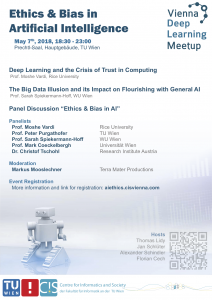(DE) Algorithmic Decision Making & AMS Algorithmus: 10 Forderungen für eine Zukunft mit algorithmischen Systemen
October 23, 2018
TweetLecture Series: Aspects of the Digital Transformation
September 26, 2018
The Centre for Informatics and Society (CIS) of the Faculty of Informatics at the TU Wien is hosting a public lecture series on Aspects of the Digital Transformation.
The Digital Transformation describes the fundamental changes society is currently undergoing due to the rapid and ubiquitous adaptation of digitial tools and technologies. Be it governance in the form of e-Democracy, search engines and the values they carry within their design and vision or the impact of new, data-driven business models on scientific inquiry: the impact of the Digital Transformation is as varied as it is ubiquitous.
Bridging the gap between digital technologies and their impact on society, the lectures cover a wide range of topics, from designing for quality of life in the digital age to the politics of search engines. International academics present multiple facets of the Digital Transformation related to their research.
Schedule
Prof. Gerhard Fischer
Exploring Design Trade-Offs for Quality of Life in Human-Centered Design
October 22nd, 2018 at 17:00 at the Kontaktraum
Prof. Ehud Shapiro
Computational Foundations for e-Democracy
November 12th, 2018 at 17:00 at the Zemanek HS
Prof. Klaus Kornwachs
Data – Interests – Ontologies: How business models distort science
December 10th, 2018 at 17:00 at the Kontaktraum
Dr. Astrid Mager
Visions and values in European search engine design
January 21st, 2018 17:00 at the Kontaktraum
More detailed information will be announced at lectures.cisvienna.com shortly.
Information
Registration via email is recommended due to limited space.
The lectures are free and open to the general public and will be held in English.
Questions and discussion with the speakers are encouraged after the lectures, and refreshments will be provided after the lectures as well.
Ethics & Bias in Artificial Intelligence
May 7, 2018
 The Vienna Deep Learning Meetup and the Centre for Informatics and Society invite you to an evening of discussion on the topic of Ethics and Bias in AI. As promising as machine learning techniques are in terms of their potential to do good, the technologies raise a number of ethical questions and are prone to biases that can subvert their well-intentioned goals.
The Vienna Deep Learning Meetup and the Centre for Informatics and Society invite you to an evening of discussion on the topic of Ethics and Bias in AI. As promising as machine learning techniques are in terms of their potential to do good, the technologies raise a number of ethical questions and are prone to biases that can subvert their well-intentioned goals.
Machine learning systems, from simple spam filtering or recommender systems to Deep Learning and AI, have already arrived at many different parts of society. Which web search results, job offers, product ads and social media posts we see online, even what we pay for food, mobility or insurance – all these decisions are already being made or supported by algorithms, many of which rely on statistical and machine learning methods. As they permeate society more and more, we also discover the real world impact of these systems due to inherent biases they carry. For instance, criminal risk scoring to determine bail for defendants in US district courts has been found to be biased against black people [1], and analysis of word embeddings has been shown to reaffirm gender stereotypes because of biased training data. While a general consensus seems exist that such biases are almost inevitable, solutions range from embracing the bias as a factual representation of an unfair society to mathematical approaches trying to determine and combat bias in machine learning training data and the resulting algorithms.
Besides producing biased results, many machine learning methods and applications already in use today raise complex ethical questions. Should governments use machine learning and AI methods to determine the trustworthiness of their citizens (cf. [3])? Should the use of algorithmic systems that are known to have biases be tolerated to benefit some while disadvantaging others? Is it ethical to develop AI technologies that might soon replace many jobs currently performed by humans? And how do we keep AI and automation technologies from widening society’s divides, such as the digital divide or income inequality?
These and many more questions and issues need a broad and multidisciplinary discussion to ensure a fair and overall beneficial future of AI and related technologies. This event aims to provide a platform for debate in the form of two keynotes and a panel discussion with five international experts from numerous scientific fields.
This event has already happened. Watch the recording of the live stream, or take a look at the photos!
Tweet
